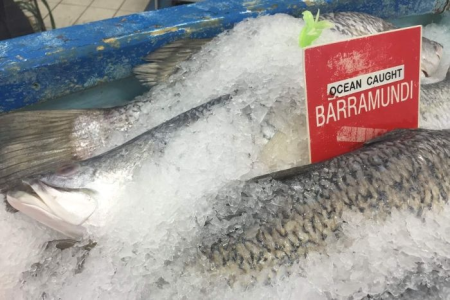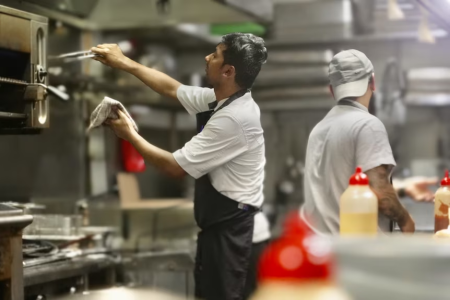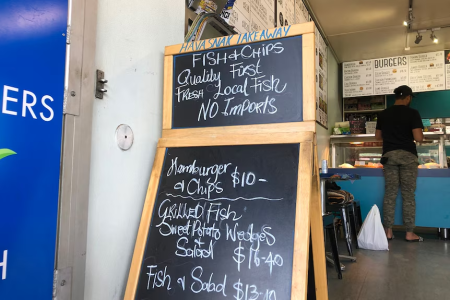New laws mean restaurants and cafes will need to label seafood as imported or Australian
By
ABC News
- Replies 1
It is common to pick up Australian seafood at the supermarket with few qualms.
Since around 2006, "country of origin" labelling has been mandatory for packaged seafood sold in retail outlets.
But these laws have not applied to restaurants, pubs or takeaway shops including fish and chip vans — until now.
Under the "AIM" labelling method, customers will start seeing an A for "Australian", I for "imported" or M for "mixed origin", as hospitality businesses start moving towards a similar labelling system to grocery stores.
The domestic seafood market is valued at about $3 billion.
Seafood Industry Australia has been pushing for the change, saying the laws will help Australian fishers — who are held to high environmental and welfare standards — compete with a huge amount of imports.
More than 60 per cent of seafood in Australia is imported.
Seafood Industry Australia chief executive Veronica Papacosta said imports "weren't terrible", but clear communication between businesses and customers was needed.
"There is a real assumption made by a lot of Australians that when they're sitting down to a seafood meal in a food service operation, that it is Australian because there's an absence of labelling," Ms Papacosta said.
She said the changes were not needed for beef and chicken meat, which are almost completely sourced domestically.

Veronica Papacosta says with an absence of labelling, consumers may incorrectly assume they are eating Australian seafood. (Supplied: Seafood Industry Australia)
Changes to help consumers know what they're paying for
Ms Papacosta said the quality and price of seafood — including items sharing the same name — could vary depending on whether or not it was imported.
"If you're down at the pub or the local Thai place, getting a curry on a Tuesday night, an imported prawn might be just fine for that price level.
"But if you're in a mid-range or a high-range restaurant, you're going to want to know that, at that price, you're paying for Australian," she said.
Ms Papacosta said the new labelling system would help customers make informed decisions, with people generally wanting to buy home-grown seafood.
"Until recently, when you bought fresh salmon in a restaurant or in a retail store, it was always Tasmanian," she said.
"But the Australian government lifted a ban on imported fresh salmon, which means we now have salmon from Chile in the system.
"Now consumers may have to question whether they are buying Australian — or Tasmanian — or Chilean salmon."
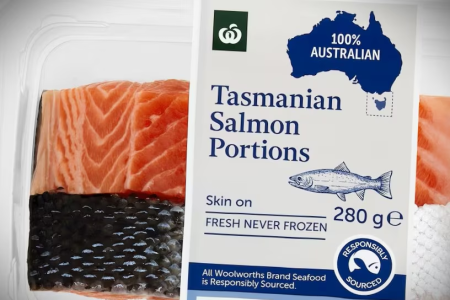
Seafood sold in Australian supermarkets already has to be labelled with its country of origin. (Woolworths)
'A great thing for the seafood industry'
Director of Hobart seafood restaurant Mures, Will Mure, said the rules were "definitely a great thing for the seafood industry" because consumers would know what they were buying.
"There is some seafood that isn't caught sustainably or ethically, and you often can't differentiate between them," Mr Mure said.
He said the high ethical and sustainability standards placed on Australian fishers, including quotas on most fisheries, "comes at a cost".
"What we do know is that Australian seafood is sustainable and it is ethical, and that's a good thing. There's a premium on that — it's very well-managed, Australian seafood.
"But it's a beautiful product and you can have confidence when you eat it that you're eating a sustainable product," Mr Mure said.
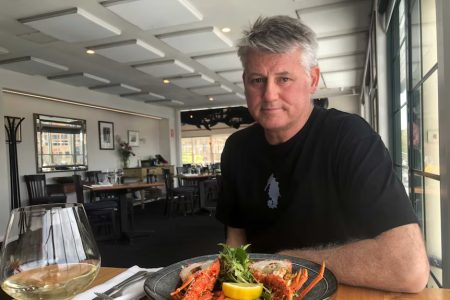
Will Mure says Australian seafood must comply with higher ethical and sustainability standards. (ABC News: Alison Braney)
Businesses given a year to transition
The year-long transition period will include a final four-week consultation to help businesses adjust.
Ms Papacosta said Seafood Industry Australia was working with the Primary Industries Department to help businesses navigate the changes.
"When you're running a food services business, it's really busy, it's sometimes seven days a week, so you don't have a lot of time to think about upgrades or optimising what you're doing," she said.
She recommended businesses have conversations with customers and suppliers.
"Where they are using either Australian or imported, having those conversations with their customers to help them understand that choice will be really important.
"And then obviously some menu changes, I think there'll be some reprinting or designing that will have to happen to reset menus to make sure that they're applying the new legislation accurately."
The laws will be enforced from July 1 next year.
Written by Madeleine Rojahn, ABC News.

